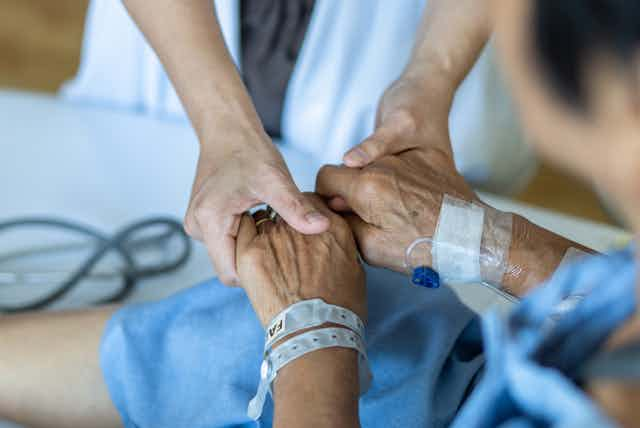New South Wales is moving closer to legalising voluntary assisted dying. But there are hurdles ahead.
After days of speeches in the NSW lower house, MPs voted yesterday – 53 in favour and 36 against – to consider the Voluntary Assisted Dying Bill 2021 in detail.
Now MPs will consider multiple amendments, largely around proposed safeguards, before the bill returns to the upper house.
So what does this mean for terminally-ill people in NSW?
Independent MP Alex Greenwich tabled the bill in the lower house last month. The bill largely reflects the voluntary assisted dying legislation passed in other Australian states.
To be eligible for voluntary assisted dying, a person must be:
an adult with decision-making capacity
have a condition that is advanced, progressive and will cause death within six months (or 12 months for a neurodegenerative disease)
be acting voluntarily and not because of pressure or duress
be experiencing intolerable suffering
must have lived in NSW for 12 months before their first request for voluntary assisted dying, and
must be an Australian citizen, permanent resident or a resident of Australia for three years or more.
As with other states, there is a rigorous request and assessment process. A person must make three requests, and be assessed as eligible by two senior doctors who have completed mandatory training.
After the person has been assessed as eligible, the bill requires one of these senior doctors (the “coordinating” doctor) to apply to the Voluntary Assisted Dying Board for authorisation to proceed.
The bill permits registered health practitioners (doctors, nurses and others) to conscientiously object to participation, a feature of other Australian voluntary assisted dying legislation.
The bill also regulates the extent to which individual institutions can hinder access to voluntary assisted dying, for instance, by requiring institutions to allow access to voluntary assisted dying in certain situations. This aspect is also a feature of South Australian and Queensland laws.
Consistent with other states, the Voluntary Assisted Dying Board will monitor how the law operates.
Read more: Voluntary assisted dying will be debated in NSW parliament this week. Here's what to expect
What happens next?
The next step is for MPs to consider the bill in detail.
Judging by the experience of other states, we can expect an onslaught of proposed amendments. Indeed, this has already started, with amendments debated until late last night.
Amendments will likely involve adding new safeguards. In Queensland, for example, proposed amendments included making a psychiatric assessment of someone’s capacity mandatory as part of the eligibility assessment, a requirement for one of the doctors to be a specialist in the person’s illness, and a requirement for a consultation with a palliative care specialist. These amendments were ultimately rejected.
Amendments that introduce more safeguards raise significant barriers to patients accessing voluntary assisted dying. Considered together, the above proposed amendments would have added three new specialist health practitioners to the process, each needing to be available in the person’s location and not have a conscientious objection. The law would have been unworkable.
It is also important to consider the amendments in the context of the bill as a whole.
The NSW bill is narrow and conservative (like the other Australian models) with extensive procedural safeguards.
The bill currently requires two independent assessments of a person’s capacity to request voluntary assisted dying, by doctors who will be trained on their additional legal duties under the bill. Doctors are also required to refer to an expert if they are unsure about the person’s capacity. When considered in this context, a mandatory psychiatric assessment is unnecessary.
Caution is needed as this last minute “piling on” of safeguards is risky. Amendments would be “add ons” to an established model and run the risk of introducing unintended consequences. They could also make the law unwieldy, incoherent and even unworkable.
Read more: One year of voluntary assisted dying in Victoria: 400 have registered, despite obstacles
NSW can learn from other jurisdictions
As NSW is the last state in Australia to be passing such legislation, its MPs have the benefit of multiple parliamentary committees, expert panels and extended parliamentary debates in the other states.
The issues likely to be raised in amendments will not be new. Every other state has already considered, debated and resolved how best to deal with them; this is reflected in the current bill.
MPs in NSW also have the benefit of research on Victoria’s regime, which has been in operation for more than two years. This reveals participating doctors do not have concerns about safety. Reports from Victoria’s Voluntary Assisted Dying Review Board also show only eligible people are receiving assistance to die.
There is therefore a heavy onus on MPs proposing amendments to justify why they are needed.
What should the amendments look like?
We challenge MPs proposing amendments to answer two questions.
First, what is the new problem the amendments are trying to solve that is not already addressed well? Second, because this law is about terminally-ill patients, what impact would any amendments have on their ability to access voluntary assisted dying?
If the evidence from Victoria is these laws are already safe, how would additional amendments making patient access even harder improve this bill?
Read more: In places where it's legal, how many people are ending their lives using euthanasia?

